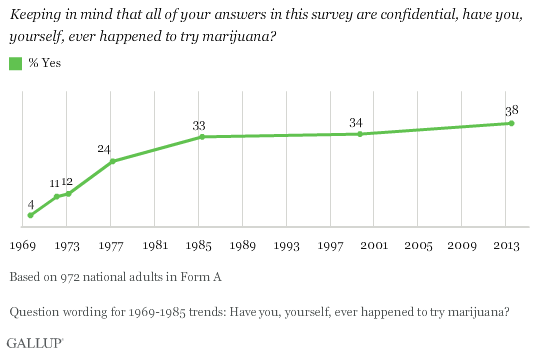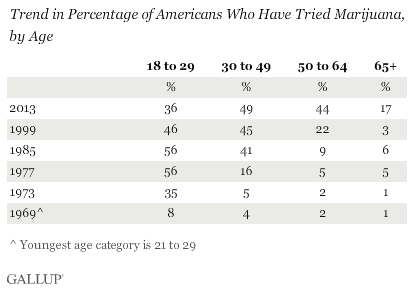Are young Americans turning against marijuana?
A study shows a decline in use among adults between the ages of 18 and 29


A free daily email with the biggest news stories of the day – and the best features from TheWeek.com
You are now subscribed
Your newsletter sign-up was successful
More Americans support legalizing pot than ever before, but some of them may be getting a little burned out on actually using the drug, according to a new Gallup survey.
While the overall percentage of Americans who admitted to smoking pot in their lifetime has remained relatively stable for the past 30 years, that has obscured a downward trend in usage among young Americans.
Thirty-eight percent of respondents admitted to Gallup that they had smoked weed at some point in their lives, a minor increase from the 34 percent who said the same in 1999, and from the 33 percent who said likewise in 1985.
The Week
Escape your echo chamber. Get the facts behind the news, plus analysis from multiple perspectives.

Sign up for The Week's Free Newsletters
From our morning news briefing to a weekly Good News Newsletter, get the best of The Week delivered directly to your inbox.
From our morning news briefing to a weekly Good News Newsletter, get the best of The Week delivered directly to your inbox.

However, the consistency is largely thanks to a huge spike in the percentage of older folks who tried the drug decades ago, and have since grown to replace the last generation of older Americans who almost universally shunned it. While just 2 percent of Americans ages 50 to 64 had tried marijuana in 1969, 44 percent of that age bracket said they had in the latest survey.
Meanwhile, the percentage of Americans ages 18 to 29 who have used marijuana dropped from a high of 56 percent in 1985 to just 36 percent today.

So what gives? Did Nancy Reagan really convince a generation of young Americans to "just say no?"
The data does appear to line up with the former first lady's anti-drug campaign, since a chunk of the young adults in Gallup's survey would have been born around the time President Reagan was in office. In 1986, he signed into law the National Crusade for a Drug Free America bill, which placed an emphasis not only on pursuing drug dealers, but on turning kids off of drugs in the first place.
A free daily email with the biggest news stories of the day – and the best features from TheWeek.com
Another possible explanation is that the rise of prescription drugs and painkillers has begun to displace other drugs. Between 1991 and 2010, opioid prescriptions leapt to 209.5 million, from 75.5 million, while stimulant prescriptions jumped to 45 million, from 5 million, according to the National Institute on Drug Abuse. As a result, Americans ages 15 to 27 have been abusing painkillers at a rate 40 percent higher than in previous generations, according to a 2012 University of Colorado study.
"Prescription drug use is the next big epidemic," said Richard Miech, who led that study. "Everyone in this field has recognized that there is a big increase in the abuse of nonmedical analgesics, but our study shows that it is accelerating among today's generation of adolescents."
Then again, it's also possible Gallup's results are something of an anomaly.
A Pew survey released in April determined that 56 percent of adults between the ages of 18 and 29 had smoked weed in their lives — fully 20 points higher than what Gallup found. The Pew survey also found that 48 percent of all American adults had tried pot, compared to 38 percent who admitted as much to Gallup. Both surveys had margins of error of 3 percent.
Jon Terbush is an associate editor at TheWeek.com covering politics, sports, and other things he finds interesting. He has previously written for Talking Points Memo, Raw Story, and Business Insider.
-
 6 fantastic homes with fun rooms for kids
6 fantastic homes with fun rooms for kidsFeature Featuring an organic modern house in Austin and historic Chicago abode
-
 Democrats seek calm and counterprogramming ahead of SOTU
Democrats seek calm and counterprogramming ahead of SOTUIN THE SPOTLIGHT How does the party out of power plan to mark the president’s first State of the Union speech of his second term? It’s still figuring that out.
-
 Climate change is creating more dangerous avalanches
Climate change is creating more dangerous avalanchesThe Explainer Several major ones have recently occurred
